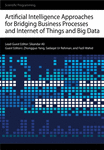Journal list menu
Export Citations
Download PDFs
Research Article
Open Access
oa
Analysis and Research on Nonlinear Complex Function Approximation Problem Based on Deep Learning
- First Published: 2022
Research Article
Open Access
oa
[Retracted] A Dynamic Econometric Analysis of Urbanization and Ecological Environment in Silk Road Economic Belt
- First Published: 2022
Research Article
Open Access
oa
Prediction of Per Capita Ecological Carrying Capacity Based on ARIMA-LSTM in Tourism Ecological Footprint Big Data
- First Published: 2022
Research Article
Open Access
oa
An Innovative Approach to Investigate the Effects of Artificial Intelligence Based on Complex Bipolar Picture Fuzzy Information
- First Published: 2022
Research Article
Open Access
oa
Energy Management Model of Intelligent Park Based on Improved Depth Deterministic Gradient Strategy Algorithm
- First Published: 2022
Research Article
Open Access
oa
CSR Performance, Executive Compensation Incentive and Innovation Investment of Chinese Private Enterprises under Dynamic Perspective
- First Published: 2022
Research Article
Open Access
oa
Design and Optimized Application of Online Financial Management System Based on Internet of Things
- First Published: 2022
Research Article
Open Access
oa
Research on Online Learner Modeling and Course Recommendation Based on Emotional Factors
- First Published: 2022
Research Article
Open Access
oa
Financial Derivative Price Forecasting and Trading for Multiple Time Horizons with Deep Long Short-Term Memory Networks
- First Published: 2022
Research Article
Open Access
oa
A Building Energy-Saving Method of Small High-Rise Office Building Based on BIM Model
- First Published: 2022
Research Article
Open Access
oa
Automatic Assessment Method of Oral English Based on Multimodality
- First Published: 2022
Research Article
Open Access
oa
Evaluation and Analysis of High Quality Economic Development Indicators by the Analytic Hierarchy Process Model
- First Published: 2022
Research Article
Open Access
oa
Semantic Graph Neural Network: A Conversion from Spam Email Classification to Graph Classification
- First Published: 2022
Research Article
Open Access
oa
Accurate Digital Marketing Communication Based on Intelligent Data Analysis
- First Published: 2022
Research Article
Open Access
oa
Prediction of Sports Aggression Behavior and Analysis of Sports Intervention Based on Swarm Intelligence Model
- First Published: 2022
Research Article
Open Access
oa
A Novel Method for Handicrafts Design Based on Fusion of Multi-Intelligent Decision Algorithm
- First Published: 2022
Research Article
Open Access
oa
Intelligent Prediction Method of Building Energy Consumption Based on Deep Learning
- First Published: 2021
Research Article
Open Access
oa
[Retracted] Sports Action Recognition Based on Image Processing Technology and Analysis of the Development of Sports Industry Pattern
- First Published: 2021
Review Article
Open Access
oa
Internet of Things Based Intelligent Techniques in Workable Computing: An Overview
- First Published: 2021
Research Article
Open Access
oa
Integrated Architecture Model of Tourism Information Service in Smart Scenic Spots Based on Hybrid Cloud
- First Published: 2021




